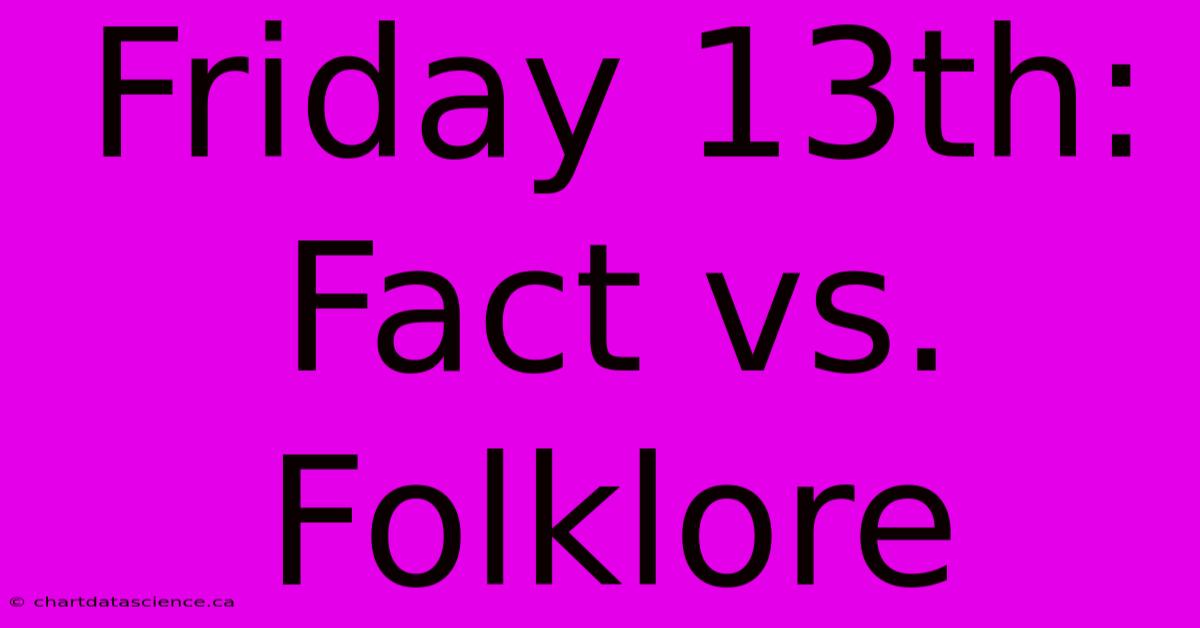Friday 13th: Fact Vs. Folklore

Discover more detailed and exciting information on our website. Click the link below to start your adventure: Visit My Website. Don't miss out!
Table of Contents
Friday the 13th: Fact vs. Folklore
Friday the 13th. The mere mention of the date sends shivers down the spines of many. Is it just superstition, or is there something more to this infamous day? Let's delve into the facts and folklore surrounding Friday the 13th and unravel the truth behind the fear.
The Roots of the Superstition: A Blend of History and Mythology
The fear of Friday the 13th, known as friggatriskaidekaphobia, isn't a recent phenomenon. Its origins are steeped in a mixture of historical events and ancient beliefs. One prominent theory connects it to the crucifixion of Jesus Christ, which is traditionally believed to have occurred on a Friday. Adding to this, the number 13 has long been associated with bad luck in various cultures, possibly stemming from the number of people at the Last Supper.
Ancient Mythology and Numerology:
Beyond Christianity, the number 13 held negative connotations in various ancient mythologies. Some cultures associated it with death or misfortune, further cementing its ominous reputation. The practice of numerology, assigning symbolic meanings to numbers, likely played a significant role in amplifying this negative association.
Friday the 13th: Psychological Impact
While there's no concrete scientific evidence to support the inherent bad luck of Friday the 13th, its psychological impact is undeniable. The mere anticipation of the day can cause anxiety and stress in susceptible individuals. This phenomenon is attributed to the power of suggestion and the self-fulfilling prophecy. Believing something bad will happen can actually increase the likelihood of it happening, at least in terms of heightened awareness of negative events.
The Confirmation Bias:
People who believe in Friday the 13th are more likely to remember negative events that occur on that day, reinforcing their belief. This is known as confirmation bias, where we tend to focus on information that confirms our pre-existing beliefs.
Dispelling the Myth: Statistical Analysis
Numerous studies have attempted to analyze accident rates and other negative events on Friday the 13th compared to other Fridays. While some studies have shown a slight increase in accidents or other unfortunate incidents, the differences are often statistically insignificant. The increased awareness and anxiety surrounding the date may actually contribute to these minor increases, rather than any inherent ill fortune.
The Power of Perception:
The perception of Friday the 13th significantly outweighs any statistical evidence. The widespread belief in the superstition itself creates a powerful psychological effect, influencing behavior and potentially leading to self-fulfilling prophecies.
Friday the 13th in Popular Culture
The enduring power of Friday the 13th is evident in its significant presence in popular culture. From horror films to literature, the date serves as a potent symbol of fear and suspense. This widespread portrayal in media further reinforces the superstition, perpetuating its existence across generations.
Conclusion: Embrace the Day, Not the Fear
While the origins of the Friday the 13th superstition are complex and rooted in history and mythology, there's no scientific evidence to support its inherent negativity. The impact of the superstition lies primarily in its psychological power. Rather than succumbing to unfounded fears, perhaps we should view Friday the 13th as a reminder of the power of belief and the importance of critical thinking. So, next time Friday the 13th rolls around, remember the facts, embrace the day, and let logic, not superstition, guide your actions.

Thank you for visiting our website wich cover about Friday 13th: Fact Vs. Folklore. We hope the information provided has been useful to you. Feel free to contact us if you have any questions or need further assistance. See you next time and dont miss to bookmark.
Also read the following articles
| Article Title | Date |
|---|---|
| Yankees Acquire Devin Williams From Brewers | Dec 14, 2024 |
| Taylor Swift Kelce Dads 10 35th Birthday Gift | Dec 14, 2024 |
| Happy 99th Dick Van Dyke | Dec 14, 2024 |
| Stolarzs Lower Body Injury | Dec 14, 2024 |
| Tonights Meteor Shower Where To Watch | Dec 14, 2024 |
